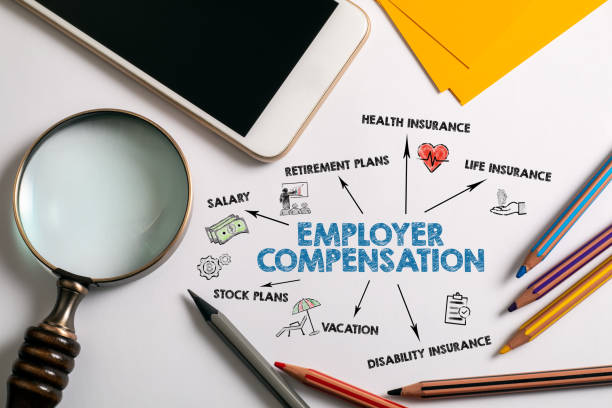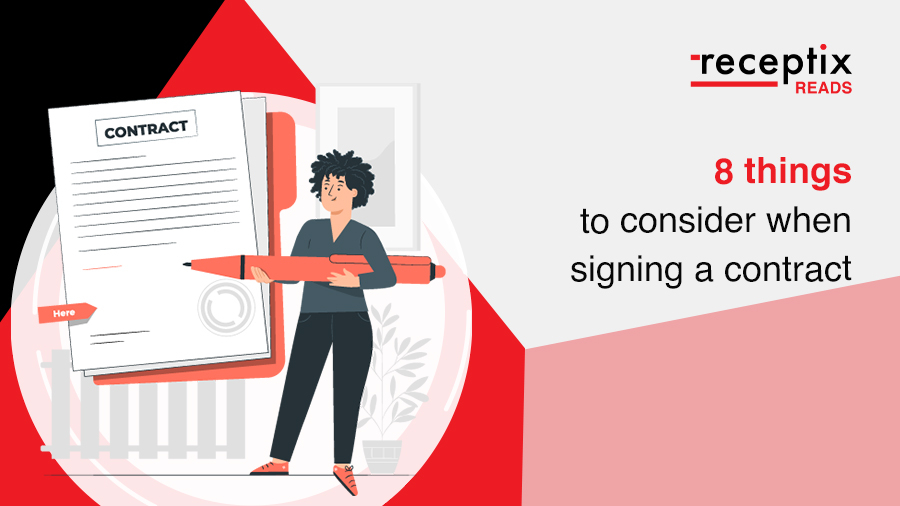You have got a new job and you are unsure about how to sign an employment contract? Worry not! We are here to help!
Here are the 8 Important Things to Know Before Signing an Employment Contract! Check them out!
1. Job Description

Check the job duties and responsibilities as mentioned in the employment contract. Ensure the description matches the information stated in the original job posting before signing an employment contract. Else, later you might find yourself doing things that you never wanted to do. Be sure of what you are willing to do & where to draw the line when asked to take on additional responsibilities or different kinds of work.
2. Salary, Benefits, and Bonuses

Make sure that your employment contract matches the salary mentioned in your offer letter. The CTC should be clearly defined so that you exactly know what would be your in-hand salary. Your contract should stipulate additional incentives and perks like bonuses, health benefits, and travel expense reimbursements. There are two kinds of bonuses – guaranteed and discretionary.
A discretionary bonus is not disclosed in advance. Read carefully & understand what you owe to the company and what you will earn on the basis of your performance. If there are any concerns, be cautious, and discuss them with the employer before signing the formal contract. Also, check the payment method & the salary release date. You should know when & how the payment would be made.
3. Paid Leaves

Taking regular breaks is critical for maintaining a work-life balance. Before signing an employment contract, check how many paid leaves you have in a year so that you can plan and utilize them accordingly. Also, pay attention to compulsory holidays, they are different for different nations. New employees should know about the number of leaves allowed to them during the probation period. Your contract should also state whether your leaves can be carried forward to the next year.
4. Working Hours

Your contract should state your working hours. Though most companies follow the basic eight-hour work day with an hour for a lunch break, many organizations now offer flexible working hours. Check how many hours you will be working each day, including the allotted time for breaks. Don’t agree to work hours that you might find disagreeable later. It’s better to negotiate a variation at the beginning of the agreement, as maintaining a work-life balance is essential for being highly productive and leading a stress-free life.
And if you are required to do overtime or have to work on weekends, check – how will you be paid for it. Sometimes instead of being paid for overtime, the employees are given holidays commonly called “time-in-lieu.” Other times employees are expected to work overtime and are not paid for it.
5. Termination

Read and understand the termination policy, and clarify in case of doubt. Be careful about termination terms before signing an employment contract, or else you might end up agreeing to terms & conditions wherein you could be terminated at any time without any notice. Even worse, without any reason. Your employment contract should include details on how your service can be terminated – Just Cause, Without Cause, and Resignation. Just Cause – When you have broken relevant contract rules. Without Cause – this often happens when the company is downsizing. Resignation – the employment contract ends when you decide to leave the company. Carefully read the termination policy before signing an employment contract.
6. Notice Period

Check your notice period, a notice period between 1-3 months is common. However, a too-long notice period can hinder your chances of joining a new company. Find out exactly how long your notice period is, and if it varies depending on the tenure of your job and the circumstance of your departure – have a plan of action for any eventuality.
It’s also important to check if is a 30-day’ notice period (unspecified) or 30 business days,’ or if is it one calendar month notice period. A 30-day notice period (unspecified) means – notice can be served on any day of the month and your employment contract will terminate in exactly 30 days (the 30 days will include weekends). A 30 business days means – 30 working days (excluding public holidays and weekends). A calendar month means – from the 1st to the 30th/31st of the month.
7. Confidentiality

The confidentiality clause restricts the employees from disclosing confidential information such as trade secrets or proprietary information to third parties.
8. Restrictive Clauses

Be careful of the restrictive clauses, they are effective post the termination of your employment and are significant for employers as they safeguard their business, clients, and other employees.
There are four such clauses – Non-competition, Non-solicitation, Non-dealing, and Non-poaching. Non-competition clause – restricts you from working for your employer’s competitors. Non-solicitation clause – prevents you from hiring past workers or current or past clients. Non-dealing clauses – limits you from dealing with former customers and suppliers. Non-poaching clauses- prevent former employees from poaching former colleagues. You have to check & ensure these restrictive covenants are not negatively impacting your future job opportunities. Knowing & understanding what is on your employment contract will help you make an informed decision and allow you to carefully weigh your options before signing an employment contract.

